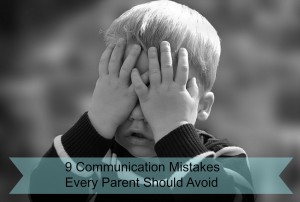7 Communication Mistakes Every Parent Should Avoid
Your child may be a miniature version of you – or not! — but children (ages 0-17) are not miniature adults, no matter how much they act or insist to you that they are, and no matter how much they actually believe that they are. Communication with your child will vary based on their age and stages of functioning; however, all children need you to avoid the following 7 things, in order to grow and develop in a healthy way.
- Do not be distracted when a child wants to talk to you. Give your individual attention. Do not try to multi-task. Do not read, watch T.V., doze off, or stay busy with other tasks. If you are too busy to talk, simply say so and make time for the child later. Otherwise, your distraction and/or impatience will be obvious to your child, causing your child’s desire to talk to you to decrease over time. Put your devices down, turn of the T.V., shut the door, etc. Let your nonverbal cues tell the child you are available.
- Do not say unkind words to your child. Unkind words tear children down and teach them that they are not good enough. Unkind words from parents (and other adults) cause children to have shame and low self-esteem, both of which are toxic. If you do make a mistake and say unkind words to a child, make sure that you tell them you are sorry as soon as you can and that you correct what you said. The truth is that children can be very frustrating and may make you want to say bad words all day. Take your frustrations and unkind words about your child to the Lord (if you believe in Him) or to an empty chair (if you do not) – but never take your frustrations to your child (Lund). Do take love to your child.
- Do not assume children can talk openly about their feelings. If children don’t want to talk, that is okay. They will share their feelings when they feel safe.
- Try not to jump in with words or advice until the end of the conversation. Sometimes, talking out feelings and having someone listen is all a child really wants or needs. Once a child feels heard and understood, his/her original problem may shrink into a manageable perspective or even disappear.
- Do not always take a child’s questions and comments at face value (Clemson University Cooperative Extension Service). Look for nonverbal cues. Nonverbal behavior such as a hunched back or curled lip can put a child’s words into context. Sometimes children speak of hidden fears and ask for reassurance indirectly with questions (Clemson University Cooperative Extension Service).
- Do not encourage your child to take sides. They love both of their parents. They can become confused and torn because of their love and loyalty for both parents. Do not speak negatively about the other parent in front of a child. Reassure a child with a touch or a hug and an apology, if you make a mistake.
- Do not use children as a sounding board. Remember that children are just children. Look to other adults for advice when you need help with personal decisions.
These 7 things can be hard to avoid, as a parent. However, by working to avoid these negative communication behaviors with your child, you will help your child out. Improving your communication with your child will not only help your child develop more healthily, but it will also help you have a better relationship with your child. If you need help working on your communication with your child, schedule an appointment at Center for Marriage and Family Counseling today! You are not on your own.
References:
Clemson University Cooperative Extension Service. (n.d.). Communication. Retrieved from http://www.clemson.edu/fyd/Assets/Adobe_Acrobat_files/bfs_communication.pdf
Lund, J. (2004) How to Hug a Teenage Porcupine. Covenant Communication.

